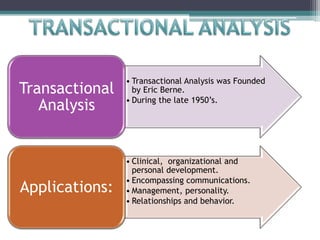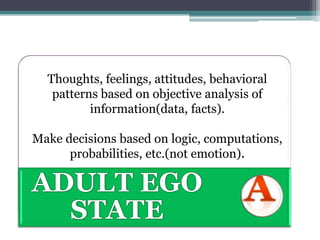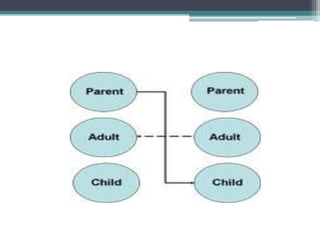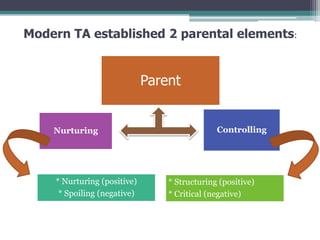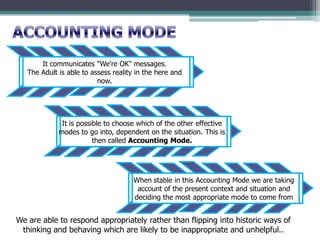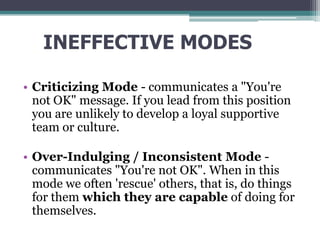Transaction analysis
- 1. MBA- MS- 5 Yrs-7th Semester
- 2. • Transactional Analysis was Founded Transactional by Eric Berne. • During the late 1950’s. Analysis • Clinical, organizational and personal development. • Encompassing communications. Applications: • Management, personality. • Relationships and behavior.
- 3. • Transactional Analysis is Transactional effectively a language within a language; Analysis • A language of true meaning, feeling and motive. • To understand more clearly what is going on. • Secondly, we give ourselves It helps us in choices of what ego states to 3 ways: adopt. • Which signals to send, and where to send them.
- 4. According to Transactional Analysis there are 3 types of Ego States-
- 5. EGO STATES Parent Ego Stage- Adult Ego Stage- Child Ego Stage- Behaviors, thou Behaviors, thoug Behaviors, thou ghts and hts and feelings ghts and feelings copied which are direct feelings replayed from parent or responses to the parent figures. from childhood. here and now.
- 6. Parent: Thoughts, feelings, attitudes, behavioral patterns based on messages or lessons learned from parents and authoritarian sources. PARENT EGO STATE
- 7. Thoughts, feelings, attitudes, behavioral patterns based on objective analysis of information(data, facts). Make decisions based on logic, computations, probabilities, etc.(not emotion). ADULT EGO STATE
- 8. Thoughts, feelings, attitudes, behavioral patterns based on child-like emotions, impulses, feelings we have experienced. Example- Impulsive happy, curious, angry, Self-center, pleasure CHILD seeking , fearful. EGO STATE
- 9. In Simple Words: Parent is our 'Taught' concept of life Adult is our 'Thought' concept of life Child is our 'Felt' concept of life
- 11. TRANSACTION ANALYSIS MECHANISM • Berne’s starting-point was that when two people encounter each other, one of them will speak to the other. This he called the Transaction Stimulus • The reaction from the other person is called the Transaction Response. • The person sending the Stimulus is called the Agent. • The person who responds is called the Respondent.
- 12. • We can interact with each other from any ego state. • Anytime one person recognizes another with a smile, a nod, a frown, a verbal greeting, etc., this recognition, in TA language, is called a “Stroke". • Two or more strokes make a transaction.
- 13. Transactions: Complementary Crossed Ulterior
- 14. Complementary transactions • A complementary transaction occurs when a message, sent from a specific ego state, gets the predicted response from a specific ego state in the other person. • For example, if a wife who is grieving her lost friend is comforted by a sympathetic husband, her momentary dependency is answered appropriately.
- 15. A wife in child state being relieved by her husband in parent state.
- 16. Crossed Transactions A crossed transaction occurs when an unexpected response is made to the stimulus. An inappropriate ego state is activated, and the lines of communication between people are crossed. At this point people tend to withdraw, turn away from each other or switch the conversation in another direction. For example, Agent's Adult: "Do you know where my cuff links are?" (note that this stimuli is directed at the Respondents Adult). Respondent's Child: "You always blame me for everything!"
- 17. Crossed transactions are a frequent source of pain between people
- 18. Ulterior Transactions Ulterior transactions are the most complex. They differ from complementary and crossed transactions in that they always involve two or more ego states. Only one ego state controls the body; but another ego state is operating in the background.
- 19. Ulterior transaction contd… If a car salesman says to his customer, "This is our finest sports car...but maybe too racy for you," he is sending a message that can be heard by either the customer’s adult or child ego state. If the customer’s Adult hears, the response may be... "yes, you’re right, considering the requirements of my job." If the customer’s Child hears, the response may be "I’ll take it. It’s just what I want."
- 20. Thus ulterior transactions help us to get the desired response from the respondent.
- 21. The original three Parent Adult Child components were sub-divided by Wagner, Joines and Mountain to form seven element model. Modern Traditional Transactional Transactional Analysis Analysis Original 3 parental Modified into 7 adult child elements. components
- 22. Modern TA established 2 parental elements: Parent Nurturing Controlling * Nurturing (positive) * Structuring (positive) * Spoiling (negative) * Critical (negative)
- 23. Adult Represents an Adult remains as a 'accounting' single entity function or mode Which can draw on The resources of both Parent and Child.
- 24. Child Child is now commonly represented as circle with four quadrants: Adapted - Co-operative (positive) and Compliant/Resistant (negative). Free - Spontaneous (positive) and Immature (negative).
- 26. INEFFECTIVE EFFECTIVE MODES MODES Negative Controlling Positive Controlling Parent Parent Negative Nurturing Positive Nurturing Parent Parent Negative Adapted Positive Adapted Child Child Negative Free Child Positive Free Child ACCOUNTING MODES
- 27. Negative Controlling Parent communicates a "You're not OK" message, and is punitive. Negative Nurturing Parent communicates a "You're not OK" message. When in this mode the person is engulfing and overprotective Negative Adapted Child expresses an "I'm not OK" message. When in this mode the person tends to experience such emotions as depression, unrealistic fear and anxiety. Negative Free Child in this mode the person runs wild with no restrictions or boundaries. In this mode they express a "You're not OK" message.
- 28. Positive Nurturing Parent communicates the message "You're OK". When in this mode the person is caring and affirming. Positive Controlling Parent communicates the message "You're OK". It offers constructive criticism, while being caring but firm. Positive Adapted Child communicates an "I'm OK" message. From this mode we learn the rules to help us live with others. Positive Free Child communicates an "I'm OK" message. This is the creative, fun loving, curious and energetic mode.
- 29. It communicates "We're OK" messages. The Adult is able to assess reality in the here and now. It is possible to choose which of the other effective modes to go into, dependent on the situation. This is then called Accounting Mode. When stable in this Accounting Mode we are taking account of the present context and situation and deciding the most appropriate mode to come from We are able to respond appropriately rather than flipping into historic ways of thinking and behaving which are likely to be inappropriate and unhelpful..
- 31. INEFFECTIVE MODES • Criticizing Mode - communicates a "You're not OK" message. If you lead from this position you are unlikely to develop a loyal supportive team or culture. • Over-Indulging / Inconsistent Mode - communicates "You're not OK". When in this mode we often 'rescue' others, that is, do things for them which they are capable of doing for themselves.
- 32. • Compliant / Resistant Mode - expresses an "I'm not OK" or "I'm not OK and You're Not OK" message. When in this mode we over-adapt to others and tend to experience such emotions as depression or unrealistic fear and anxiety. When in this mode we are unlikely to make good team members and will be highly stressed if we have to manage others.
- 33. • Immature Mode - in this mode we run wild with no boundaries. Here we express a "You're not OK" message. At work we tend to not to take responsibility for our actions and are unlikely to progress as we need a great deal of management in order to focus our energy and keep boundaries.
- 34. EFFECTIVE MODES • Incorporated Aspects of the Accounting Mode - All of the different incorporated aspects communicate "I'm OK and You're OK". • Nurturing - When in this aspect we are caring and affirming. • Structuring - This is the boundary setting aspect, offering constructive criticism. In this aspect we are caring and firm.
- 35. • Cooperative - From this aspect we learn the rules to help us live with others. • Playful - This is the creative, fun loving, curious and energetic aspect. We can confront people playfully as a way of dealing with a difficult situation. This can diffuse a potential problem and get the message across.
- 36. CONCLUSION Transactional analysis is a rational and easy-to- understand method of clarifying and managing human relationships and behaviors.
- 37. THANK YOU
- 38. Submitted by- • Anjali Patel • Roma Gajbhiye • Seema Vishvakarma • Uzma Hussain


